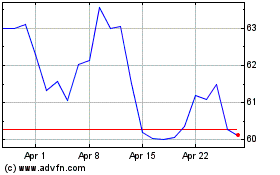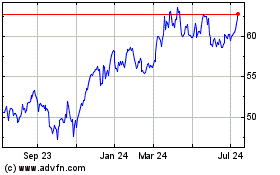New Comments Could Broaden Debate On Proposed SEC Proxy Rules
December 30 2009 - 2:06PM
Dow Jones News
Members of the financial industry are hoping to expand the
debate with regulators over how to give shareholders more leeway to
nominate directors to corporate boards, as the U.S. Securities and
Exchange Commission moves toward finalizing new rules early next
year.
The Altman Group, a proxy solicitation and corporate governance
consulting firm, is asking executives and directors of public
companies to participate in a short survey on the impact of the
SEC's proposed rules, which were issued in July.
The U.S. Chamber of Commerce is using a second comment
period--opened by the SEC earlier this month--to flesh out its
members' concerns with the proposed rules.
The proxy access proposal has been championed by SEC Chairman
Mary Schapiro as a response to the financial crisis in which
critics say risk-taking at companies went unchecked.
Proxy access can give shareholders a credible path for ousting
boards, which they can then use to push for mergers, asset sales,
larger dividends or other measures to boost share prices. Schapiro
believes the rule would hold boards accountable to the company's
owners.
The SEC's proposed rules would allow shareholders of companies
with a global market value of $700 million or more to have their
board nominees included in corporate proxy materials if they own at
least 1% of the company's shares. The ownership percentages would
increase for smaller firms under the rule.
The chamber opposes the idea, noting that it would affect some
15,000 companies, all with unique shareholder-board relations.
"You have a diversity of different structures that spring up and
a diversity of management structures," said Tom Quaadman, executive
director of the chamber's capital markets center.
The chamber claims the SEC doesn't have the authority to
promulgate the rules, but its members' comments will address a
variety of concerns and raise new arguments, Quaadman said.
For example, shareholders with easier access to the board ballot
box could perpetuate a "short-termism" attitude on corporate
boards, Quaadman said. Larger shareholders, perhaps with an agenda,
could have front-of-the-line access to elections.
"You start to move the focus of directors away from corporate
management and going from annual election to annual election,"
Quaadman said.
The Altman Group, meanwhile, has teamed up with Nasdaq OMX Group
Inc. (NDAQ) to solicit company responses to its own survey about
the SEC's proposed rules.
"We were frankly shocked at the low level of response" to the
first request for comments, said Altman Group Chief Executive Ken
Altman. "We think it's important in this case that all viewpoints
should be represented."
The Altman Group also compiled an analysis of some 500 comments
the SEC received on its proposed proxy access rules.
Altman said corporations and institutional investors raised
similar questions about how the new proxy nomination process would
work, which may have prompted the SEC to reopen the comment
period.
Congress also is wading into the issue, which is likely to make
it easier for the SEC to act. Without substantive changes in the
rule or congressional action, the final proxy rules will almost
certainly face a lawsuit.
In the House, a broad financial overhaul bill, passed earlier
this month, includes language giving the SEC the authority to act
in the proxy area.
The Senate version is still being drafted, but Sen. Charles
Schumer (D., N.Y.), a key negotiator, is seeking language in the
measure giving shareholders access to companies' proxy forms if
they want to nominate directors to their board.
The Senate also is pondering broader shareholder issues,
although it is unclear whether those provisions will make it into
the final measure.
Under a draft financial overhaul bill unveiled in autumn by
Senate Banking Committee Chairman Chris Dodd (D, Conn.),
shareholders would be given a nonbinding, advisory vote on
executive compensation packages, a concept often referred to as
"say on pay."
-By Fawn Johnson, Dow Jones Newswires; 202-862-9263;
fawn.johnson@dowjones.com
Nasdaq (NASDAQ:NDAQ)
Historical Stock Chart
From Mar 2024 to Apr 2024

Nasdaq (NASDAQ:NDAQ)
Historical Stock Chart
From Apr 2023 to Apr 2024
